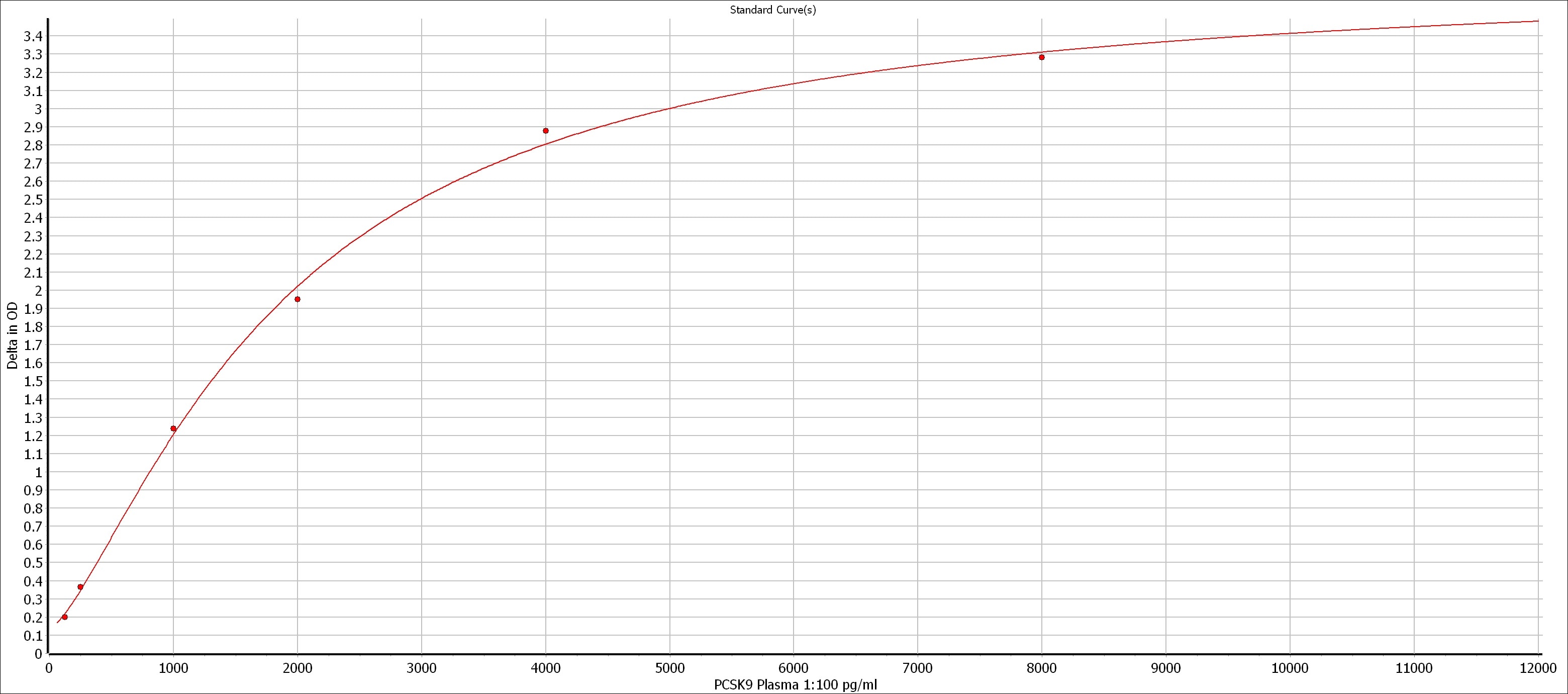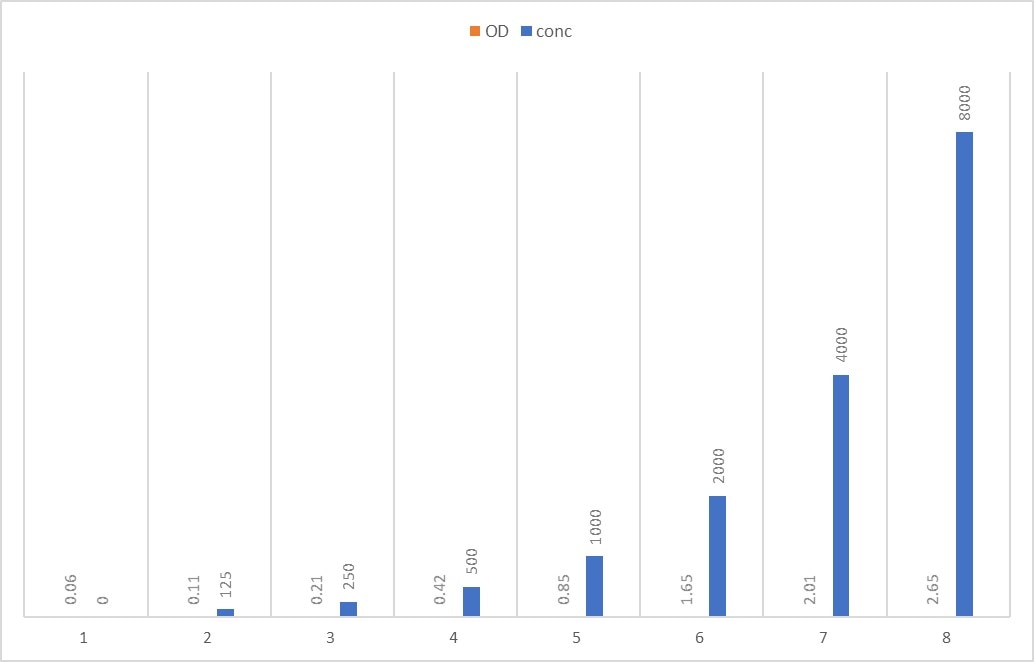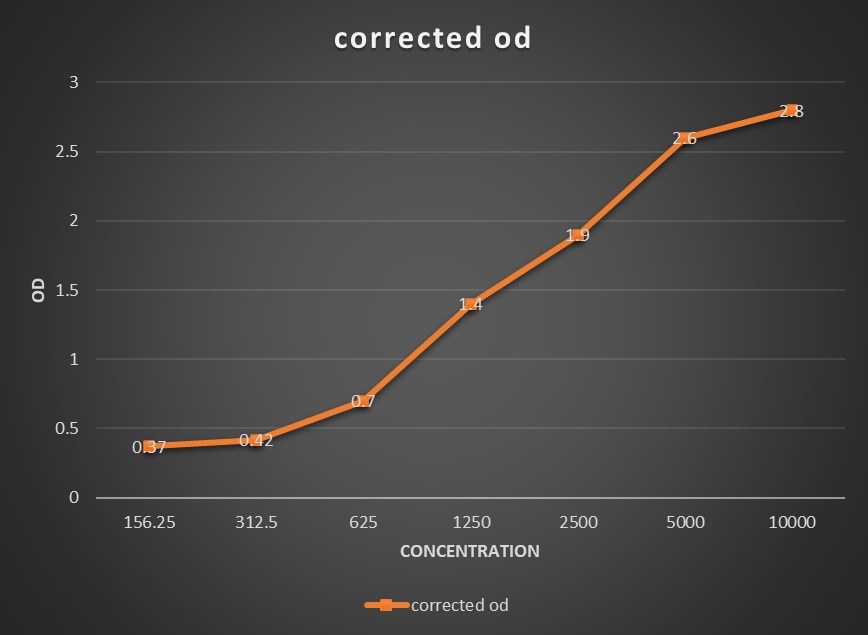Human Proprotein Convertase 9/PCSK9 DuoSet ELISA Summary
* Provided that the recommended microplates, buffers, diluents, substrates and solutions are used, and the assay is run as summarized in the Assay Procedure provided.
This DuoSet ELISA Development kit contains the basic components required for the development of sandwich ELISAs to measure natural and recombinant human Proprotein Convertase 9/PCSK9. The suggested diluent is suitable for the analysis of most cell culture supernate samples. Diluents for complex matrices, such as serum and plasma, should be evaluated prior to use in this DuoSet.
Product Features
- Optimized capture and detection antibody pairings with recommended concentrations save lengthy development time
- Development protocols are provided to guide further assay optimization
- Assay can be customized to your specific needs
- Economical alternative to complete kits
Kit Content
- Capture Antibody
- Detection Antibody
- Recombinant Standard
- Streptavidin conjugated to horseradish-peroxidase (Streptavidin-HRP)
Other Reagents Required
DuoSet Ancillary Reagent Kit 2 (5 plates): (Catalog # DY008) containing 96 well microplates, plate sealers, substrate solution, stop solution, plate coating buffer (PBS), wash buffer, and Reagent Diluent Concentrate 2.
The components listed above may be purchased separately:
PBS: (Catalog # DY006), or 137 mM NaCl, 2.7 mM KCl, 8.1 mM Na2HPO4, 1.5 mM KH2PO4, pH 7.2 - 7.4, 0.2 µm filtered
Wash Buffer: (Catalog # WA126), or 0.05% Tween® 20 in PBS, pH 7.2-7.4
Reagent Diluent: (Catalog # DY995), or 1% BSA in PBS, pH 7.2-7.4, 0.2 µm filtered
Substrate Solution: 1:1 mixture of Color Reagent A (H2O2) and Color Reagent B (Tetramethylbenzidine) (Catalog # DY999)
Stop Solution: 2 N H2SO4 (Catalog # DY994)
Microplates: R&D Systems (Catalog # DY990)
Plate Sealers: ELISA Plate Sealers (Catalog # DY992)
Scientific Data
Product Datasheets
Preparation and Storage
Background: Proprotein Convertase 9/PCSK9
Proprotein convertase subtilisin kexin 9 (PCSK9), also named neural apoptosis-regulated convertase 1 (NARC-1), is a member of the proteinase K subfamily of subtilisin-related serine endoproteases. The full-length protein has 692 amino acids, including a signal peptide, a pro- domain, and a catalytic domain. PCSK9 is highly expressed in the liver, intestine, and kidney. It is initially synthesized as a soluble 74 kDa precursor protein. In the endoplasmic reticulum, it undergoes autocatalytic intramolecular cleavage to generate a 14 kDa pro- domain and a 60 kDa catalytic domain. These two domains remain associated when PCSK9 is secreted outside the cells (1-3). The primary physiologic function of PCSK9 is to mediate the degradation of low density lipoprotein receptor (LDL R). Early observations indicated that gain-of-function missense mutations in the PCSK9 gene can cause an autosomal dominant form of hypercholesterolemia (4, 5). The expression of PCSK9 was observed to be up-regulated by the sterol regulatory element binding proteins (SREBPs), a family of transcription factors that are responsible for the upregulation of genes involved in cholesterol and fatty acid metabolism, such as the LDL R gene (6, 7). Further experimental evidence revealed that in mice, when the PCSK9 gene was knocked out, the number of LDL R in hepatocytes increased, whereas when PCSK9 was over-expressed, the amount of LDL R protein was reduced in the liver (8, 9). In humans, genetic analyses have shown that individuals who have nonsense or loss-of-function mutations in the PCSK9 gene have significantly lower plasma LDL cholesterol levels (10, 11). These investigations clearly indicated that PCSK9 plays a key role in reducing the hepatic LDL R levels. Recently, the underlying mechanism has been uncovered: under normal physiologic conditions, the LDL R is internalized on the cell surface and directed to the endosomes in order to be recycled back to the cell surface. PCSK9 binds to the EGF domain of the LDL R and prevents LDL R from being sorted to the endosomes. Instead, the PCSK9/LDL R complex is redistributed to the lysosomes for degradation (12-14). As such, PCSK9 regulates the amount of LDL R in the circulation and modulates cholesterol levels. Serum PCSK9 concentrations have been found to be directly associated with cholesterol levels (15, 16). Since individuals with loss-of-function PCSK9 mutations have strikingly reduced risk of coronary heart diseases, PCSK9 has become an attractive drug target in recent years (17, 18). One approach is to generate small molecules that are able to interfere with PCSK9 autoactivation and its interaction with LDL R. Other approaches aiming to reduce the amounts of PCSK9 in the circulation, such as small interfering RNAs (siRNAs), have also shown promise (19, 20).
Assay Procedure
GENERAL ELISA PROTOCOL
Plate Preparation
- Dilute the Capture Antibody to the working concentration in PBS without carrier protein. Immediately coat a 96-well microplate with 100 μL per well of the diluted Capture Antibody. Seal the plate and incubate overnight at room temperature.
- Aspirate each well and wash with Wash Buffer, repeating the process two times for a total of three washes. Wash by filling each well with Wash Buffer (400 μL) using a squirt bottle, manifold dispenser, or autowasher. Complete removal of liquid at each step is essential for good performance. After the last wash, remove any remaining Wash Buffer by aspirating or by inverting the plate and blotting it against clean paper towels.
- Block plates by adding 300 μL Reagent Diluent to each well. Incubate at room temperature for a minimum of 1 hour.
- Repeat the aspiration/wash as in step 2. The plates are now ready for sample addition.
Assay Procedure
- Add 100 μL of sample or standards in Reagent Diluent, or an appropriate diluent, per well. Cover with an adhesive strip and incubate 2 hours at room temperature.
- Repeat the aspiration/wash as in step 2 of Plate Preparation.
- Add 100 μL of the Detection Antibody, diluted in Reagent Diluent, to each well. Cover with a new adhesive strip and incubate 2 hours at room temperature.
- Repeat the aspiration/wash as in step 2 of Plate Preparation.
- Add 100 μL of the working dilution of Streptavidin-HRP to each well. Cover the plate and incubate for 20 minutes at room temperature. Avoid placing the plate in direct light.
- Repeat the aspiration/wash as in step 2.
- Add 100 μL of Substrate Solution to each well. Incubate for 20 minutes at room temperature. Avoid placing the plate in direct light.
- Add 50 μL of Stop Solution to each well. Gently tap the plate to ensure thorough mixing.
- Determine the optical density of each well immediately, using a microplate reader set to 450 nm. If wavelength correction is available, set to 540 nm or 570 nm. If wavelength correction is not available, subtract readings at 540 nm or 570 nm from the readings at 450 nm. This subtraction will correct for optical imperfections in the plate. Readings made directly at 450 nm without correction may be higher and less accurate.
Citations for Human Proprotein Convertase 9/PCSK9 DuoSet ELISA
R&D Systems personnel manually curate a database that contains references using R&D Systems products. The data collected includes not only links to publications in PubMed, but also provides information about sample types, species, and experimental conditions.
8
Citations: Showing 1 - 8
Filter your results:
Filter by:
-
Drug Repurposing Flubendazole to Suppress Tumorigenicity via PCSK9-dependent Inhibition and Potentiate Lenvatinib Therapy for Hepatocellular Carcinoma
Authors: Jin, W;Yu, J;Su, Y;Lin, H;Liu, T;Chen, J;Ge, C;Zhao, F;Geng, Q;Mao, L;Jiang, S;Cui, Y;Chen, T;Jiang, G;Li, J;Miao, C;Xiao, X;Li, H;
International journal of biological sciences
Species: Human
Sample Types: Cell Culture Supernates, Serum
-
Prognostic Impacts of LL-37 in Relation to Lipid Profiles of Patients with Myocardial Infarction: A Prospective Cohort Study
Authors: R Chen, H Zhao, J Zhou, Y Wang, J Li, X Zhao, N Li, C Liu, P Zhou, Y Chen, L Song, H Yan
Biomolecules, 2022-10-14;12(10):.
Species: Human
Sample Types: EDTA Plasma
-
Association of PCSK9 with inflammation and platelet activation markers and recurrent cardiovascular risks in STEMI patients undergoing primary PCI with or without diabetes
Authors: L Song, X Zhao, R Chen, J Li, J Zhou, C Liu, P Zhou, Y Wang, Y Chen, H Zhao, H Yan
Cardiovascular Diabetology, 2022-05-20;21(1):80.
Species: Human
Sample Types: Plasma
-
Identification of a Variant in APOB Gene as a Major Cause of Hypobetalipoproteinemia in Lebanese Families
Authors: C Ayoub, Y Azar, Y Abou-Khali, Y Ghaleb, S Elbitar, G Halaby, S Jambart, MH Gannagé-Ya, C Yaghi, C Saade Riac, R El Khoury, JP Rabès, M Varret, C Boileau, P El Khoury, M Abifadel
Metabolites, 2021-08-24;11(9):.
Species: Human
Sample Types: Serum
-
Rapid Decline of Serum Proprotein Convertase Subtilisin/Kexin 9 (PCSK9) in Non-Cirrhotic Patients with Chronic Hepatitis C Infection Receiving Direct-Acting Antiviral Therapy
Authors: J Grimm, G Peschel, M Müller, D Schacherer, R Wiest, K Weigand, C Buechler
Journal of Clinical Medicine, 2021-04-11;10(8):.
Species: Human
Sample Types: Serum
-
Membrane type 1 matrix metalloproteinase promotes LDL receptor shedding and accelerates the development of atherosclerosis
Authors: A Alabi, XD Xia, HM Gu, F Wang, SJ Deng, N Yang, A Adijiang, DN Douglas, NM Kneteman, Y Xue, L Chen, S Qin, G Wang, DW Zhang
Nature Communications, 2021-03-25;12(1):1889.
Species: Human
Sample Types: Plasma
-
Low levels of PCSK9 are associated with remission in patients with rheumatoid arthritis treated with anti-TNF-&alpha: potential underlying mechanisms
Authors: J Frostegård, S Ahmed, I Hafström, S Ajeganova, M Rahman
Arthritis Research & Therapy, 2021-01-19;23(1):32.
Species: Human
Sample Types: Serum
-
Association of circulating proprotein convertase subtilisin/kexin type 9 levels and the risk of incident type 2 diabetes in subjects with prediabetes: a population-based cohort study
Authors: J Shi, W Zhang, Y Niu, N Lin, X Li, H Zhang, R Hu, G Ning, J Fan, L Qin, Q Su, Z Yang
Cardiovascular Diabetology, 2020-12-10;19(1):209.
Species: Human
Sample Types:
FAQs
No product specific FAQs exist for this product, however you may
View all ELISA FAQsReviews for Human Proprotein Convertase 9/PCSK9 DuoSet ELISA
Average Rating: 4.3 (Based on 4 Reviews)
Have you used Human Proprotein Convertase 9/PCSK9 DuoSet ELISA?
Submit a review and receive an Amazon gift card.
$25/€18/£15/$25CAN/¥75 Yuan/¥2500 Yen for a review with an image
$10/€7/£6/$10 CAD/¥70 Yuan/¥1110 Yen for a review without an image
Filter by:
EDTA plasma, human, diluted 1:100, beautiful!




